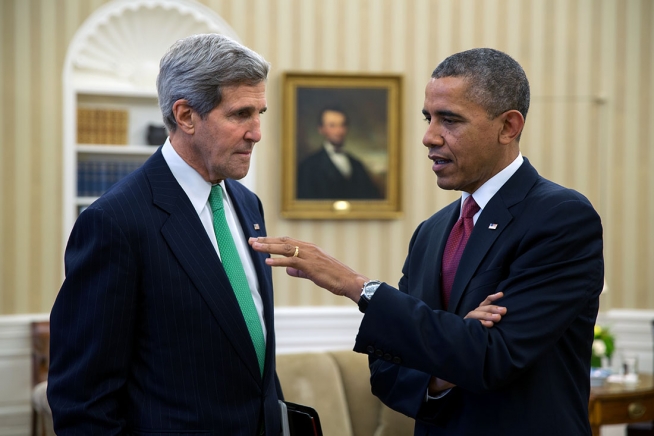Will Michigan defy Obama on lifting Iran sanctions?
Whatever its merits, the recent nuclear agreement with Iran would seem to represent good news for Michigan companies looking to gain a foothold in the Iranian economy.
Not so fast.
While the U.S. may soon lift important economic sanctions, Michigan is among roughly two dozen states that have imposed their own, state-level sanctions against Iran.
With a Republican majority in Lansing largely hostile to the deal being promoted by the White House, state sanctions will likely remain in place for the foreseeable future, even if the Iran agreement ultimately survives an upcoming congressional vote.
Indeed, if legislative leaders in Michigan have their way, Michigan will join Kansas and Mississippi in considering additional sanctions to discourage companies doing business in the state from entering Iran’s potentially lucrative markets.
In 2012, Michigan passed legislation that prohibited companies with economic relationships with Iran from submitting bids on government contracts. In addition, the state divested $185 million of its pension funds from companies including Royal Dutch Shell, Vodafone, HSBC and Nokia, for their activities in Iran.
Last week, state Sen. Jack Brandenburg (R-Harrison Township) stepped forward to propose an additional obstacle to doing business with Iran – a ban on Michigan grants, tax breaks and tax credits for any company with ties to Iran. Such a bill would specifically target the incentives provided by the Michigan Economic Development Corporation, a quasi-governmental body.
In characteristically blunt fashion, Brandenburg called the Iran accord the “most stupid thing ever” devised by President Obama and the legislator said Michigan should make an effort to disrupt the process.
Some political observers may view Brandenburg’s actions as a calculated step toward a run for Congress, as the veteran lawmaker contemplates pursuing the seat being vacated by Rep. Candice Miller in the solidly Republican 10th District. Yet, Iran sanctions have proven to be popular in red states and blue states and have been signed into law by Democratic and Republican governors in recent years.
States that have invoked additional sanctions on the Iranian regime range from GOP-dominated Texas, Georgia and the Carolinas to the blue states of California, Illinois and Massachusetts.
News reports indicate that in more than half those states with sanctions, including Michigan, the restrictions expire only if Iran is no longer viewed as a designated sponsor of terrorism or if all U.S. federal sanctions against Iran are lifted. The sanctions that will come off, if the nuclear deal survives, will apply, at least in the short term, to Iran’s financial and energy sectors, including nuclear.
Lawmakers thump chests
Michigan sanctions, even if they are expanded, are unlikely to pose a substantial financial burden on Iran.
“Oftentimes these state-level sanctions are rooted in philosophical underpinnings rather than what could have a noticeable effect,” said Professor Tomas Hult, director of the International Business Center at the Eli Broad College of Business, Michigan State University. “The Michigan statewide prohibitions against Iran are rather specific on issues related to the energy sector, including oil and natural gas and a number of related areas.”
Congress encouraged state-level restrictions in the 2010 federal law that substantially ratcheted up federal sanctions against Iran. That legislation encouraged states to disinvest their public pension funds from Iran-connected companies, similar to the manner in which past disinvestment strategies by states were aimed at South Africa, Israel or some Central American countries.
Critics of the state laws say they represent political interference in a crucial area of U.S. policy by state lawmakers who usually have little expertise in foreign affairs. The state restrictions, they add, can also complicate diplomatic efforts to portray the United States as speaking with “one voice.”
The Reuters news agency reported in April that Richard Nephew, the former principal deputy coordinator for sanctions policy at the U.S. State Department, said the main losers in state sanctions are the companies and local governments, rather than Iran or other target countries.
"The degree to which such decisions can be made at lower government levels than the federal government generally makes the United States a more complicated, unattractive place to do business," said Nephew, now with the Columbia University Center on Global Energy Policy in New York.
"This is a feel-good measure that, in the end, probably doesn't feel all that great given the costs it imposes at home."
Brandenburg counters that major corporations with a presence in Michigan that are concerned about U.S. national security and steer clear of doing business with Tehran will face no adverse economic impacts.
“Any way that we can get at this (Obama administration) agreement with Iran, we should do so,” said Brandenburg, a longtime small business owner. “My bill is a good bill and, in a small way, we can send a message.”
Brandenburg announced his proposed bill in the dead of summer when the Legislature is in recess, so the degree of support is hard to determine. However, the overwhelming support for a state Iran sanctions bill in 2012 suggests any new measure could gather wide support.
Hefty state fines
While critics of the nuclear deal worry that Iran will cheat, the current Michigan statute imposes fines of $250,000 or more on companies doing business with the state that lie about its associations with Iran.
The Iran Economic Sanctions Act, signed into law by Snyder on Dec. 28, 2012, bars any state or local governments, including schools, from contracting with companies that have Iran connections.
The law defines an Iran-linked business as an entity engaging in activities in Iran’s energy sector, including one that provides oil or liquefied natural gas tankers or helps construct or maintain pipelines. The restrictions also apply to financial institutions that extend credit to a company that’s assisting Iran’s energy sector.
Foreign-owned companies serve as the main target of these rules because U.S. firms are largely barred from working in Iran under current law.
The state Treasury Department’s Bureau of Investments carried out the disinvestments from the state’s four main pension funds. With funds invested widely in the global stock markets, the bureau compiled a review team that carried out the sanctions with the help of an international consultant, according to a Treasury spokesman, Jeremy Sampson.
The 2012 state bill limiting government contracting, sponsored by then-state senator Roger Kahn (R-Saginaw Township), was highly popular in Lansing. It received unanimous approval in the Senate and passed 107-2 in the House.
In some ways, that was the culmination of a state sanctions movement that took hold across the nation in 2008-09, with Michigan at the forefront. Marty Knollenberg, who as a Michigan state senator in 2008 sponsored an Iran sanctions bill, has said that he believes sanctions proposed by the states pushed the federal government to get tougher on Iran.
The Knollenberg bill was reportedly based in part on model legislation proposed by the American Israel Public Affairs Committee (AIPAC), a powerful, conservative pro-Israel lobbying group that is currently pushing Congress to reject the Iran nuclear deal.
In recent months, the planned easing of nuclear-based sanctions on Iran generated a near explosion of economic strategizing across Europe, Russia and China. While American companies remain cautious, given the volatile U.S.-Iran relationship since the Iranian revolution of 1979, Germany, France, Spain and Switzerland have scheduled or sent trade missions to Tehran in anticipation of key economic sanctions melting away.
An economic prize
The reason for this “pent-up enthusiasm,” as one international economist labeled it, is that Iran is a large country with an economy expected to grow at a robust rate for many years if freed from economic restrictions.
Two and a half times the size of Texas, it is home to some 80 million people, sits atop the world's fourth-largest oil reserves and the second-biggest stores of natural gas, and has well-established manufacturing and agricultural industries contributing to a $400 billion economy.
Professor Hult at MSU predicts that the greatest impact on the global economy could be a substantial drop in oil prices. With advanced technology, equipment and know-how from U.S. oil companies, Hult said, Iran could explore new oil fields and develop additional refineries.
Beyond the business opportunities in the Iranian energy sector, Iran needs considerable help in upgrading its archaic aviation industry and expanding its automotive markets.
Key U.S. players on the global economic stage, such as Chevron, Exxon Mobil, Ford, General Motors and, to a lesser extent Boeing, largely have taken a wait-and-see approach as the nuclear deal unfolds.
Meanwhile, French automaker PSA Peugeot Citroen is reportedly ready to revive its partnership with an Iranian automaker, and the Chinese auto industry has made several recent moves into Iran even before the nuclear deal was finalized.
But it is the ambitions of Fiat Chrysler Automobiles that could provide the leverage that Sen. Brandenburg hopes to create with his legislation. The Associated Press has reported that Sergio Marchionne, chief executive of FCA, said last month that the Iranian market "will be an opportunity for all of us" if it opens up. The company that grew out of the Fiat-Chrysler merger only stopped selling cars in Iran in 2012.
If Marchionne’s firm lands on a Michigan list of sanctioned companies while it pursues a new or expanded manufacturing plant in Michigan with the help of state tax breaks, the ensuing conflict might have national, or even international, implications. What’s more, FCA could, out of frustration, switch plant locations to a neighboring state.
By taking a stand on foreign policy, state lawmakers might wound Michigan companies while missing their target in Iran.
“There would be minimal ripples in Tehran,” Hult said, “but the ripples may be stronger in the Great Lakes region.”
Chad Selweski is a political writer. His blog is “Politically Speaking.” You can follow him at @cbsnewsman on Twitter
See what new members are saying about why they donated to Bridge Michigan:
- “In order for this information to be accurate and unbiased it must be underwritten by its readers, not by special interests.” - Larry S.
- “Not many other media sources report on the topics Bridge does.” - Susan B.
- “Your journalism is outstanding and rare these days.” - Mark S.
If you want to ensure the future of nonpartisan, nonprofit Michigan journalism, please become a member today. You, too, will be asked why you donated and maybe we'll feature your quote next time!


 As President Obama tries to sell Congress on an international nuclear deal that includes the lifting of most sanctions on Iran, state leaders in Lansing are urging the expansion of state-level sanctions on companies doing business with Iran. (courtesy photo)
As President Obama tries to sell Congress on an international nuclear deal that includes the lifting of most sanctions on Iran, state leaders in Lansing are urging the expansion of state-level sanctions on companies doing business with Iran. (courtesy photo) Sen. Jack Brandenburg (R-Harrison Township) calls the nuclear deal with Iran the “most stupid thing ever.”
Sen. Jack Brandenburg (R-Harrison Township) calls the nuclear deal with Iran the “most stupid thing ever.”